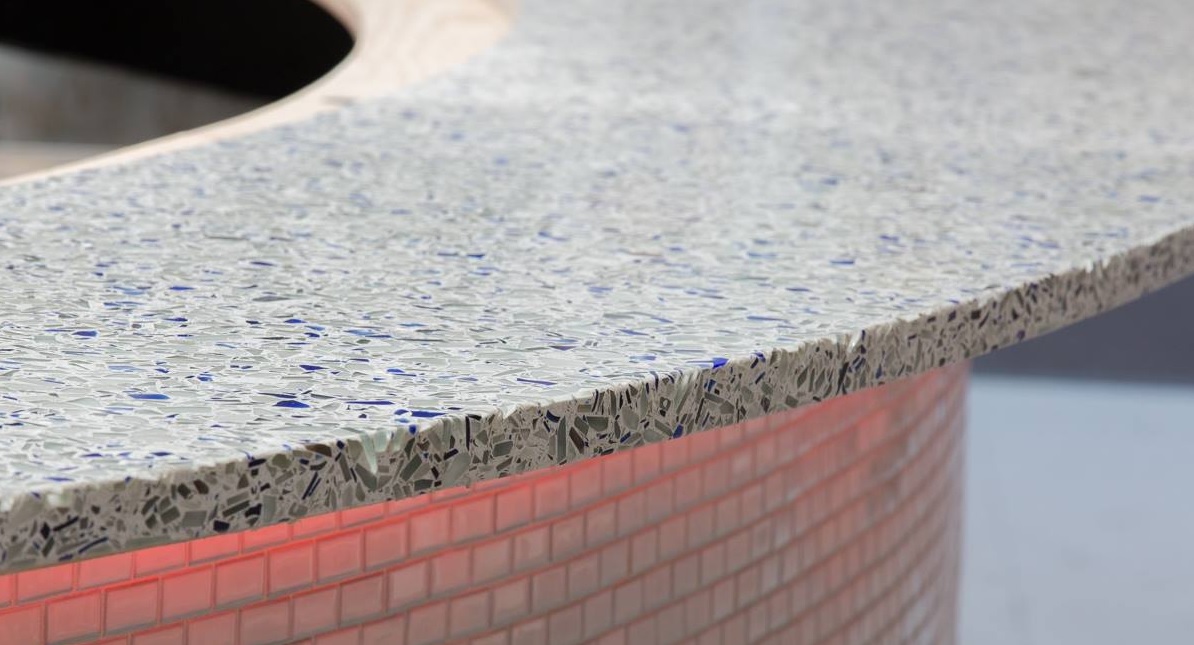Though it might not be immediately apparent, the type of surface material you use is vital to the longevity (or lack thereof) of an outdoor area or commercial surface. You’re sure to notice it in just a few short years when you begin to see chipping, scratches, or fading. Quality surface materials should last much longer than that—and, let’s be honest, be more aesthetically appealing than some of the industrial grade surfaces on the market. When it comes to choosing the right surface for a commercial application or outdoor setting, consider all the factors that may affect its performance. Here are some things to keep in mind when purchasing a countertop material.

Location, Location, Location
Perhaps the most crucial of all decision points when it comes to, well, everything about building, is location. The same rule applies to surface materials. Some surfaces are perfect for indoors, but don’t hold up as well in outdoor applications. Take, for example, quartz. The material looks beautiful and withstands indoors, but fades quickly when exposed to direct sunlight. In many cases, you should avoid placing quartz near large windows as the sunlight can cause fading to occur.
Laminate countertops encounter similar concerns, though they don’t just fade—they could warp, buckle, and incur general discoloration when exposed to heat and rain. The core of most laminate countertops is particle board, which can also rot, especially if it gets too wet. Both of these surface materials should be avoided for outdoor applications, even if the lower price point is tempting. Instead, invest in a surface material that will last.
Weathering the Weather
Another factor to consider when selecting a surface material for an outdoor setting is climate. Generally speaking, outdoor kitchens are seasonal, unless the application is in a tropical environment. With this in mind, think about what type of weather the surface might be exposed to and how often it will be used.
Snow, rain, and ice can all effect surfaces to varying degrees. Surfaces made from natural materials may stand up to the elements better than those that are made from man-made materials, like laminate. You’ll need to choose a surface that will last through every season where you live—from scorching hot sun to below-freezing temperatures, and everything in between.
Application: Commercial or Residential?
Once you have decided on where you want the new countertop to be installed, consider the setting. Surfaces installed in residential applications most likely won’t have to stand up to the same type of use as those used in commercial settings (although kids really can do a number on them.) When people think of commercial surfaces, the image that comes to mind is likely stainless steel everything. Though this look might be just right for some, there are other, more colorful options available to the savvy consumer.
For example, recycled glass countertops offer a design aesthetic without sacrificing surface durability. Vetrazzo offers this beautiful alternative option for the home and commercial environments. Made up of cement and 85% recycled glass material, they are rock-hard and visually stunning. Because of the materials used to create the eco-friendly countertops, they are highly resistant to heat, scratches, and each slab is one-of-a-kind.
Want to see how Vetrazzo surfaces hold up in a real-world commercial setting? Download our latest case study, A Perfect Match: US Open Features Vetrazzo Countertops where you can see the mosaic-like surfaces installed in an outdoor bar at the 2015 US Open.

